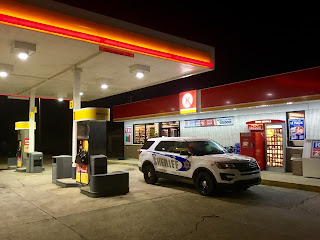“Is that all you have to
do? I need to have your job!”
She quickly walked past while dropping her verbal payload. It was sarcastic, condescending, and void of scrutiny. I smiled, not because it was funny but out of obligation.
I could have said, “Where
were you when I was picking up the pieces of a car wreck that killed three
women and a baby? or where were you when I was waiting on the fire department
to bring a ladder to cut down a man hanging by his neck in an oak tree? or
where were you when I listened to the confessions of murderers, robbers,
rapists, and thieves?” but I didn’t. I
knew what to expect when I pinned on the badge 25 years ago, and I, like many others, took the motto “To Serve and Protect” to be more than a cliché. Some
of us really believe we are called by God to do mankind's difficult chores.
Historically, lawmen in
the United States have been pretty good at protecting. They are eager to
respond to danger, right wrongs, stop violence, and risk personal safety for
the sake of others. Unique among public servants, they proactively seek to stop
danger, abuse, and violence before it occurs. They search for unsafe motorists,
drunk drivers, suspicious persons wandering in the night, and thieves who wish
to steal your possessions. Of course police sometimes make disastrous
decisions, overreact, or stretch the limits of their authority, but protecting
people and their property remains the most important duty of government. Without
protection, civilization cannot exist; however, protection alone can be indiscriminate, brutal, and out of
balance. Law enforcement protection must be more than brute force to be effective,
and the thing that tempers it for maximum affect is service.
Many people think service
is simply seeking justice for victims, and that is partially true, but an
attitude of service changes the way we protect law violators as well as
victims. It reminds police officers that humanity is vulnerable and fragile. It
helps protect police officers from themselves. It keeps protection objective
rather than subjective, and it reminds cops that they represent something
bigger than themselves. Protection and service are two sides of the same coin. To
be done correctly, protection cannot be separated from service. So, what does law
enforcement service look like?
1)
It is non-judgmental. This is hard because law enforcement
requires discretion and judgment. Cops must make a determination on many things like if a crime actually took place, how serious was it, who did it and
where are they, and is there probable cause for arrest. These are daily chores
for cops, and to make matters more difficult, experience teaches them that people are deceptive on various levels. Cops must make judgments, but they must not be
judgmental. They must refrain from applying moral standards on victims, witnesses,
and even suspects.
2)
It listens for the purpose of
understanding. This is the art of
empathy. Empathy invokes sensitivity in the hearer and causes him to
vicariously feel the experiences, thoughts, and feelings of the person he is
listening to. Empathy has been described as walking in another person’s shoes
or looking deep into a person’s soul. True service includes listening and
understanding with empathy.
3)
It brings reason to people at the most
difficult moments of their lives. Most people cops come into contact with are distracted
from reality due to a number of factors including drugs, alcohol, anger,
depression, anguish, envy, greed, mental illness, etc. Serving people means changing
their perspective by reminding them of what is true, important, and best. Changing perspectives takes time and care.
4)
It doesn’t take things personally. Wise cops recognize verbal
attacks as merely attacks on what they represent which is the
authority of the state under God. Police officers do not subjectively enforce laws
of their own making; they enforce the objective laws of the state, country, and
ultimately God. An attitude of service saves cops hours of misery by giving them
the ability to deflect the verbal smut thrown at them by distracted
people. In this country, self-expression is deemed a right, and cops cannot
justify use of force to protect themselves from words. Service teaches cops to
compartmentalize insults, criticism, and hatred. Service understands that it
doesn’t matter what a person says as long as they obey the law.
The service of properly
responding to people is law enforcement’s greatest asset in protecting the
public and results in people feeling truly protected. It also helps cops respond
properly to unsolicited insinuations they are lazy and could be replaced
by self-righteous busybodies.
My service to the woman who made the accusation was refusing to be offended by her. My protection was hiding her from the horrors of my occupation which are very real.


Now, if people would read what you wrote. Thanks for the reminder.
ReplyDelete